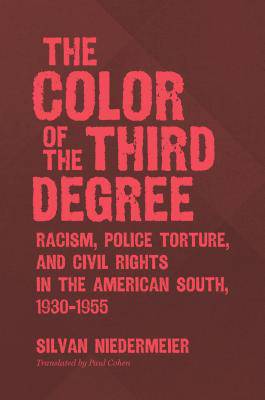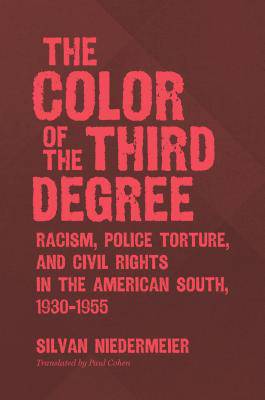
- Afhalen na 1 uur in een winkel met voorraad
- Gratis thuislevering in België vanaf € 30
- Ruim aanbod met 7 miljoen producten
- Afhalen na 1 uur in een winkel met voorraad
- Gratis thuislevering in België vanaf € 30
- Ruim aanbod met 7 miljoen producten
The Color of the Third Degree
Racism, Police Torture, and Civil Rights in the American South, 1930-1955
Silvan NiedermeierOmschrijving
Available for the first time in English, The Color of the Third Degree uncovers the still-hidden history of police torture in the Jim Crow South. Based on a wide array of previously neglected archival sources, Silvan Niedermeier argues that as public lynching decreased, less visible practices of racial subjugation and repression became central to southern white supremacy. In an effort to deter unruly white mobs, as well as oppress black communities, white southern law officers violently extorted confessions and testimony from black suspects and defendants in jail cells and police stations to secure speedy convictions. In response, black citizens and the NAACP fought to expose these brutal practices through individual action, local organizing, and litigation. In spite of these efforts, police torture remained a widespread, powerful form of racial control and suppression well into the late twentieth century.
The first historical study of police torture in the American South, Niedermeier draws attention to the willing acceptance of violent coercion by prosecutors, judges, and juries, and brings to light the deep historical roots of police violence against African Americans, one of the most urgent and distressing issues of our time.
Specificaties
Betrokkenen
- Auteur(s):
- Vertaler(s):
- Uitgeverij:
Inhoud
- Aantal bladzijden:
- 224
- Taal:
- Engels
Eigenschappen
- Productcode (EAN):
- 9781469652962
- Verschijningsdatum:
- 25/11/2019
- Uitvoering:
- Hardcover
- Formaat:
- Genaaid
- Afmetingen:
- 156 mm x 234 mm
- Gewicht:
- 521 g

Alleen bij Standaard Boekhandel
Beoordelingen
We publiceren alleen reviews die voldoen aan de voorwaarden voor reviews. Bekijk onze voorwaarden voor reviews.









